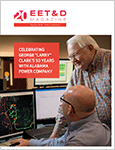Juliet Shavit is not an engineer, but that doesn’t prevent her from being the recipient of titles like “Queen of the Smartgrid,” “Woman of Power,” or from being featured in magazines like EE T&D. Because she grew up in a family of engineers, Shavit understands how they think and speak. What’s more, she is a deft communicator, who asks the right questions and is able to translate the thought processes of both engineers and everyday day consumers. As Shavit explained, “Even though I’m not an engineer, I spend a lot of time wondering how and why things work The primary difference between myself and engineers is that I focus on another dimension as well—what is that thing’s impact on me.”
It helped that Shavit grew up around engineers, but her willingness to take risks and her desire never to be bored has pushed her to do even more with her communication skills. After working at The New Yorker after college, Shavit left to become a marketing writer for a telecom company. From there, she joined a former colleague at his telecommunications billing company. Witnessing the struggles that came with technology adoption made it clear to her there was a critical need for better communication between telecom providers and their end-users. Deciding it was time to enable that communication, Shavit founded SmartMark Communications in 1999. SmartMark is a communications, strategy and new media company, where Shavit and her team serve as a bridge between marketing communications departments and engineers and technologists. They also help technology-focused companies and industries understand how to communicate these benefits to customers.
When utilities first began deploying AMI, while leveraging their network communications, Shavit was approached to assist with decoding the benefits of this new technology for industry partners and consumers alike. While she had not worked with energy clients, Shavit found the parallels between the telecommunications sector and that of the energy sector rather striking. “I had just lived through the technology transformation in the telecom industry. I have an appreciation for how those networks transform businesses. I definitely can hold my own in a room full of technologists on the energy side. I also have a business appreciation for how that technology works, because not only did I see and understand what was happening on a technology level during the telecom transformation, but it was also my job to understand the business value proposition of that technology. It is the same with energy.”
Since founding SmartMark, Shavit has established herself as an expert in translating tech-speak, while conveying to technologists the importance of engaging customers and eliciting their buy-in. Shavit has also been instrumental in changing the perception of customer value in utility business cases—something she is passionate about. This has made her popular with regulators and utilities alike—particularly now, in the age of grid modernization and large scale utility technology investment.
Her comfort level with engineers and industry acronyms, combined with her capacity for connecting with all levels of utilities and stakeholders, has earned her speaking opportunities with the likes of the Institute of International and European Affairs (IIEA), GridComms, Digital Transformation World and TIA Jam.
As new technology emerges, and as more utilities migrate towards grid modernization, Shavit sees a tremendous need for a greater customer education effort. In response to this need, Shavit launched SmartEnergy IP, a research and consulting organization within SmartMark Communications that is focused on helping utilities understand how the smart grid benefits their customers. Shavit uses SmartEnergy IP’s findings to ensure effective communication between companies and their stakeholders. More important, she draws upon the information to stress the importance of the customer’s role.
“I’m really passionate and very excited about how tech companies are paying more attention to the consumer on so many levels,” said Shavit, “whether it’s making the customers’ lives easier, addressing data privacy or including them in conversations on the roadmap of where this technology is headed.”
In spite of her optimism, Shavit cautions utilities to keep in mind that at the end of the day, they’re serving customers and not ratepayers. “We’re on this journey together,” said Shavit.
“Our lives have become more digital, and businesses are trying to wrap their head around the impact digital will have on the customer experience. Companies need to use customer responses as a barometer when budgeting for and plotting their technology roadmap. If utilities can harness what that means and optimize this new customer/utility dynamic, they will see success. If we exclude customers from that discussion, I would not be too optimistic about these technology investments working out.”
If you are looking to establish a stronger communication channel, you may wonder how to get the conversation started between utilities, stakeholders and consumers. On the SmartMark Communications’ website (www.smartmarkglobal.com), visitors can find links to Shavit’s presentations she has given at industry events, as well as interviews in publications where she explains the role of the consumers in smart grid modernization.
 Juliet Shavit is president and CEO of SmartMark Communications, and a world- renowned leader in strategic communications and customer experience. She has been called the “Smart Grid Queen” by European Communications for her pioneering work in defining the role of customer in smart grid deployments. She’s also been lauded as a “Woman of Power” by Mobile Europe for her active role in helping the communications industry monetize IoT.
Juliet Shavit is president and CEO of SmartMark Communications, and a world- renowned leader in strategic communications and customer experience. She has been called the “Smart Grid Queen” by European Communications for her pioneering work in defining the role of customer in smart grid deployments. She’s also been lauded as a “Woman of Power” by Mobile Europe for her active role in helping the communications industry monetize IoT.
Shavit started SmartMark Communications in 1999, helping it move from a public relations firm into an award winning, global full-service communications agency serving government organizations, as well as Fortune 500, public and private companies in a variety of industries. Today the company is transforming even further, actively moving into emerging technology applications and innovation for improved customer experience.







